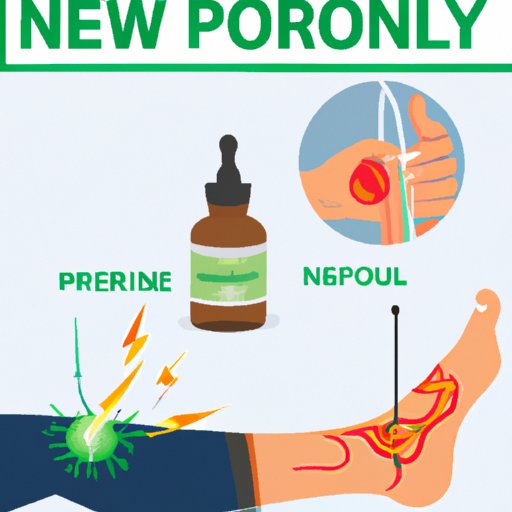
Introduction
Neuropathy is a nerve condition that affects millions of people worldwide. It causes a range of symptoms, including pain, numbness, tingling, and weakness. These symptoms can be debilitating and impact a person’s quality of life. It is essential to find the most effective treatment for neuropathy to alleviate the pain and improve daily activities.
A Comprehensive Guide to Understanding and Managing Neuropathy: Five Effective Treatment Options
There are several treatment options for neuropathy. Here are five effective treatment options:
1. Medication
Medication is one of the most common treatments for neuropathy. Drugs such as gabapentin and pregabalin are commonly prescribed to alleviate nerve pain. These drugs work by slowing down nerve signals in the body, reducing pain and other symptoms of neuropathy.
Pros: Medications are often effective at reducing pain and improving daily activities.
Cons: Users may experience side effects such as dizziness, drowsiness, and weight gain.
2. Physical Therapy
Physical therapy involves exercises and movements to improve strength and flexibility. This treatment option can benefit people with neuropathy by improving balance and reducing pain.
Pros: Physical therapy is a non-invasive treatment that has few side effects.
Cons: Physical therapy may not be effective for everyone, and it requires a commitment to attend regular sessions.
3. Nerve Stimulation
Nerve stimulation involves applying an electrical current to nerves to reduce pain and improve function. This technique can be achieved through several methods, including transcutaneous electrical nerve stimulation (TENS) and spinal cord stimulation.
Pros: Nerve stimulation can provide immediate relief from pain and reduce the need for medication.
Cons: Nerve stimulation requires specific devices to be implanted or worn, and there are risks associated with these techniques.
4. Topical Creams
Topical creams can be applied directly to the affected area to reduce pain and inflammation. They typically contain ingredients such as capsaicin, lidocaine, or menthol.
Pros: Topical creams are non-invasive and easy to use.
Cons: These creams may cause skin irritation or allergic reactions.
5. Surgery
Surgery is a last-resort treatment option for neuropathy. It is only recommended when other options have failed and the nerve damage is severe.
Pros: Surgery can repair nerve damage and restore function in severe cases.
Cons: Surgery is an invasive treatment option with a risk of complications.
Neuropathy Treatment: A Comparison of the Top Solutions Available
When deciding on the best treatment for neuropathy, several factors must be considered, including effectiveness, cost, convenience, and other factors.
According to a study by the American Academy of Neurology, medication, physical therapy, and nerve stimulation are the most effective treatment options for neuropathy.
However, the most effective treatment depends on the severity of the nerve damage and a person’s individual needs. Consulting a doctor or specialist is vital in determining the best treatment option.
Expert Consultation: Determining the Best Neuropathy Treatment for You
During a consultation with a doctor or specialist, several important questions should be asked, including:
- What are my options for treatment?
- How long will treatment take?
- What are the risks and benefits?
- How will this treatment improve my symptoms?
Factors to consider when making a final decision on a treatment option include:
- The severity of neuropathy symptoms
- The effectiveness of the treatment
- The cost of the treatment
- The convenience of the treatment
- The potential risks and side effects of the treatment
Top-Ranked Neuropathy Treatments Recommended by Medical Professionals
Based on the severity of nerve damage and individual needs, the following treatments are recommended by medical professionals:
- Medication
- Physical Therapy
- Nerve Stimulation
These treatments have been proven to alleviate pain and increase function in people with neuropathy.

Personalized Neuropathy Treatment Plans: The Future of Managing Nerve Pain
Personalized treatment plans are becoming more common in managing neuropathy pain. These plans take into account the individual’s symptoms, severity of nerve damage, and treatment preferences to create a customized plan for relief.
Advantages of personalized treatment plans include:
- Higher effectiveness rates
- Reduced risk of side effects
- Improved quality of life
To get a personalized treatment plan for neuropathy, consult a doctor or specialist.
Natural Ways to Treat Neuropathy Symptoms without Medication
Natural remedies can help alleviate neuropathy symptoms without medication. Here are some natural ways to alleviate neuropathy symptoms:
- Exercise to improve circulation
- Adjusting diet to include more anti-inflammatory foods
- Reducing stress through mindfulness and relaxation techniques
Important considerations when using natural remedies include consulting with a doctor or specialist and being patient. Natural remedies may take longer to take effect than medications.
Proven Home Remedies to Help Alleviate Neuropathy Pain
Home remedies can also help alleviate neuropathy pain. Here are some proven home remedies:
- Massaging the affected area to improve circulation
- Using warm compress to relieve pain and inflammation
- Taking supplements such as alpha-lipoic acid and vitamin B12
Precautions to take when using home remedies include consulting with a doctor or specialist and being mindful of potential side effects.
Conclusion
Neuropathy is a nerve condition that affects millions of people worldwide. The most effective treatment for neuropathy depends on the severity of symptoms, individual needs, and preferences. It is essential to consult a doctor or specialist to determine the best treatment option. With the right treatment plan, people with neuropathy can alleviate pain and improve their quality of life.




